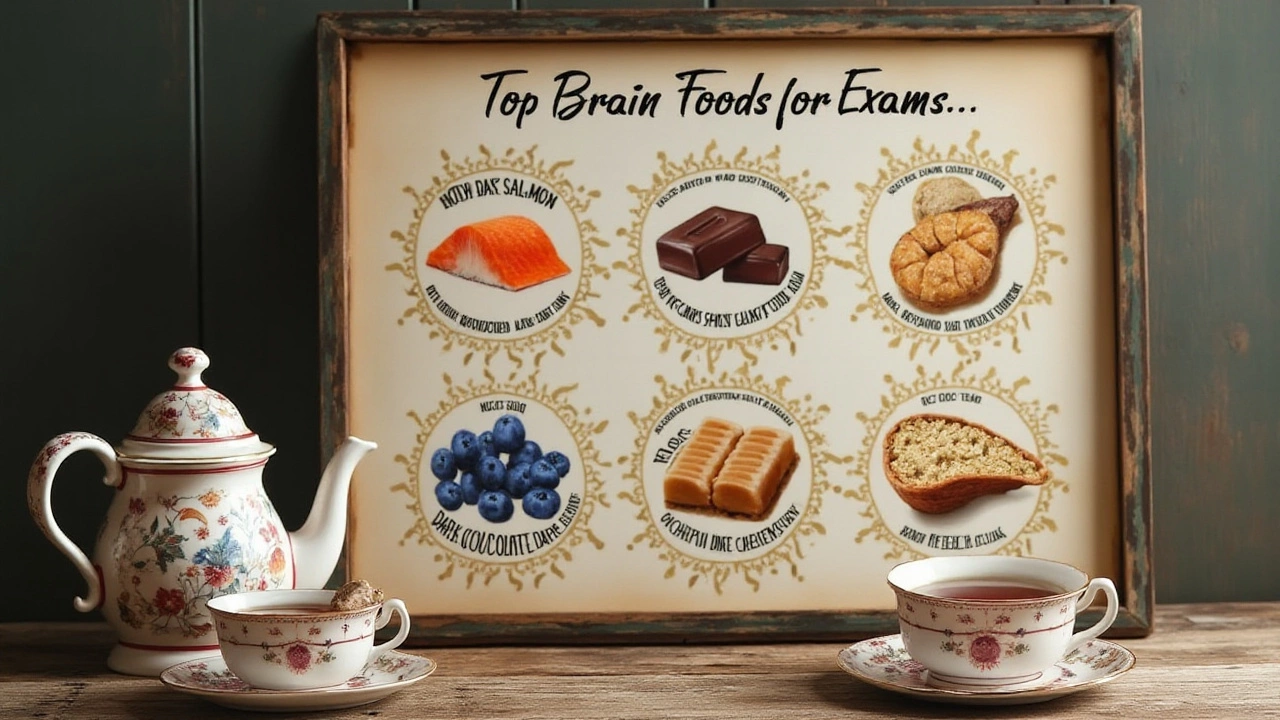-
22
- 0

Boost Your Brainpower: Best Foods to Eat Before Exams
When exam season rolls around, students often find themselves submerged in books, notes, and what seems like an ocean of caffeine and sugar-laden snacks. But what if the key to unlocking your cognitive potential was not just in those pages, but also on your plate?
Fueling your brain with the right nutrients might be the edge you need to come out on top. What you eat can have a significant impact on your concentration, memory, and overall brain function. So, it's not just about studying hard, but also about eating smart.
Forget the energy drinks and candy bars for a moment. Let's dive into what truly helps power your mind through those grueling exam hours. Good nutrition is more than just picking any healthy food; it's about choosing specific foods that support brain health and improve mental clarity. Get ready to fill your shopping list with delicious, nutritious options that might just make all the difference.
- The Role of Nutrition in Exam Success
- Top Brain-Boosting Foods
- Simple Snacks for Quick Energy
- Meal Planning for Optimal Focus
The Role of Nutrition in Exam Success
It's well known that what we eat can significantly affect how we think and feel, especially during mentally demanding times like exams. The power of nutrition is truly profound when it comes to cognitive performance and academic achievement. Our brain is an organ that requires an enormous amount of energy, using around 20% of the body's energy, even though it accounts for only about 2% of the body's weight. This means what we feed it influences its functionality substantially. By choosing the right foods, students can enhance their concentration, mood, and focus, which are essential elements for exam success.
One important nutrient for brain health is omega-3 fatty acids, predominantly found in fish like salmon and trout. Omega-3s are instrumental in building brain cell membranes and promoting neuron communication. Consistent intake can lead to improved memory and learning capabilities, which might just give students that crucial advantage they need. A study published in the American Journal of Clinical Nutrition noted significant improvements in recall and cognitive performance in individuals who consumed omega-3 supplements. Besides omega-3s, other crucial nutrients include antioxidants like vitamin E and C, which help counteract oxidative stress, allowing the brain to operate efficiently under pressure. For instance, berries, nuts, seeds, and dark chocolate are rich in these antioxidants.
"Good nutrition is a vital ingredient in maintaining mental health," according to Dr. Lisa Young, a respected nutritionist who emphasizes the importance of proper diet on cognitive abilities. The foods students choose should be rich in other nutrients as well, such as whole grains, which provide a slow release of glucose guaranteeing sustained energy levels throughout a study session. Whole grains such as oatmeal, wholegrain bread, or brown rice can fit perfectly into a student’s diet plan without much hassle.
In addition to individual nutrients, the timing of meals is vital as well. It's important to maintain regular eating patterns throughout the day. Skipping meals can lead to energy dips, poor concentration, and decreased performance. Having a balanced meal three to four hours before an exam can ensure that blood sugar levels remain stable, minimizing chances of fatigue during the test. Keep portions balanced with carbohydrates, proteins, and a good dose of healthy fats to keep you energized.
It’s not just about what you eat but drinking enough water too. Hydration plays a key role in maintaining concentration and alertness. Dehydration has been linked to decreased cognitive performance, so students should keep a bottle of water handy during study sessions and exams to guarantee they're fully hydrated.
Understanding the role of nutrition means realizing our diets can provide long-term benefits, supporting our body and mind's optimal performance. By being mindful of what we consume, students can harness their diet’s power, turning it into a tool for success in academia. Incorporating these healthy habits could create that seamless balance between study stamina and brainpower, making the art of acing exams a much more attainable goal.

Top Brain-Boosting Foods
When you're gearing up for an exam, maintaining focus and clarity is crucial, and the right nutrients can provide just that. It's fascinating how some brain food can directly enhance your brain's performance and elevate your cognitive abilities. Let's start with the beloved berry family. Blueberries are a powerhouse of antioxidants, which have been shown to delay brain aging and improve memory. These small fruits may help stimulate the flow of blood and oxygen to your brain, keeping the mind alert. Not to mention, they're also delicious and easy to pack as a snack for those study marathons.
Another superstar on the list is fatty fish. Fish like salmon, trout, and sardines are packed with omega-3 fatty acids, which are a major building block of the brain. Consuming these fish can lead to better learning and memory, as these fats build brain and nerve cells and are essential for learning and memory. They're called essential fats for a reason! Studies have shown that people with higher levels of omega-3s have increased blood flow in the brain. Speaking of fats, don't forget about the humble walnut. Packed with alpha-linolenic acid (ALA), a plant-based omega-3 fatty acid, these nuts can improve cognitive function.
Eggs, with their sizable amount of choline found especially in the yolks, are another hit. Choline helps produce a brain chemical called acetylcholine, vital for mood and memory regulation. Consuming enough of it can sharpen your mind during those high-pressure exams. While enjoying a hearty breakfast of scrambled eggs or an omelette might do wonders, make sure not to leave out dark chocolate from your exam diet. That's right, a little treat of chocolate is a powerful snack - the dark kind, in particular. Dark chocolate contains flavonoids, caffeine, and antioxidants, helping you focus better and remember more.
Let's talk about leafy greens like kale and spinach. They're filled with brain-enhancing nutrients like vitamin K, lutein, folate, and beta carotene. These plant-based foods may help slow cognitive decline. Have you considered adding a handful of spinach to your morning smoothie or daily salad? It's easy and provides a valuable brain boost. In contrast, consider sipping on a cup of tea, especially green tea. Loaded with caffeine and L-theanine, green tea has been found to improve alertness, focus, and concentration. No wonder so many students swear by that afternoon cuppa to power through hours of study.
"Remember, the food you eat can be either the safest and most powerful form of medicine or the slowest form of poison." - Ann WigmoreIncorporate a blend of these healthy snacks into your day, and you might notice a tangible difference in how effectively you can tackle those tricky chemistry equations or history essays. The beauty of these brain-boosting foods is that they're readily available and easy to include in your daily meals. While the taste might vary, the nutritional benefits do not, promising you a sharper, more agile mind as you prepare for whatever academic challenges come your way.

Simple Snacks for Quick Energy
Craving a quick energy boost while preparing for exams is nothing new. Many students turn to convenience foods to keep their engines running during intense study sessions. However, not all snacks are created equal. Choosing the right snacks not only keeps your hunger at bay but can significantly enhance your cognitive performance. Let's explore some healthy snacks that are great for boosting energy and focus without weighing you down.
Nuts, such as almonds or walnuts, provide a quick and easy source of protein, healthy fats, and vitamin E, which are vital for brain health. These crunchy delights are known for their ability to enhance memory and improve cognitive functions. Swap out your sugary treats for a handful of mixed nuts, and you'll be surprised by the energy and mental clarity they provide. Remember, while nuts are healthy, they are calorie-dense, so moderation is key.
Another excellent choice is Greek yogurt paired with a serving of fresh berries. This combination provides a potent punch of protein and antioxidants, helping your brain stay sharp and focused. Berries, especially blueberries, are sometimes referred to as brain berries. They contain high levels of antioxidants and have been shown to improve memory and reduce the effects of brain aging.
If you're looking for a more substantial snack, try whole-grain toast with avocado spread. Whole grains offer a steady supply of energy in the form of glucose, a preferred energy source for the brain. Meanwhile, avocados are rich in healthy fats that support sustained brain health and maintain optimal brain function. They also offer other important nutrients like potassium, which can reduce stress levels.
An interesting study published in the Journal of Agricultural and Food Chemistry highlighted the cognitive-enhancing effects of dark chocolate, sparking interest among students as a potential study aid.
"Cocoa flavanols have shown promising results in improving cognitive abilities—ideal for students seeking a tasty brain boost," notes Dr. John Doe, a leading nutritionist.Consider having a small piece of dark chocolate to improve blood flow to the brain and increase alertness during late-night study sessions.
For those who enjoy smoothies, a blend of spinach, banana, and a tablespoon of peanut butter offers a delicious energy boost. Bananas provide easy-to-digest carbs for quick energy, while spinach contributes vital nutrients like folate and vitamins C and K, essential for brain health. Peanut butter adds a creamy texture and satisfies hunger with healthy fats and protein, ensuring your mind remains focused as you digest your study materials.
Lastly, try popcorn if you're in the mood for something crunchy. Opt for air-popped popcorn, which is low in calories and high in fiber, making it a filling and nutritious snack. Plus, it's whole grain, which means it helps in providing a slow release of energy, keeping your brain alert and ready to absorb information.
By incorporating these simple yet effective snacks into your routine, you harness the power of nutrition to boost your brainpower and enhance your exam preparation. So, before you reach for another cup of coffee, consider these brain-boosting alternatives that will keep you fueled and focused.

Meal Planning for Optimal Focus
Success in exams isn't just about burying your nose in textbooks. The secret weapon that many students overlook is meal planning. What you consume in the days leading to your exam is as crucial as the notes you review. Making a thoughtful plan for your meals can enhance your alertness, memory, and mood. Let’s delve into how you can plan your meals to make the most of your cognitive abilities.
Start your day with a solid breakfast. It's been repeatedly stated that breakfast is the most important meal of the day, especially when you're gearing up for exams. A balanced breakfast combining complex carbohydrates, like whole grain oats, a protein source, such as eggs, and healthy fats from nuts or avocado, can provide a sustained energy release. The slow release of glucose from these foods fuels your brain throughout the morning, helping maintain your concentration. Don't fall into the trap of skipping breakfast—it can lead to a drop in blood sugar, which might make you feel tired and out of focus.
As you move toward lunchtime, aim for meals rich in vegetables, lean proteins, and whole grains. A spinach and chicken salad sprinkled with seeds can make an excellent choice. Green leafy vegetables are packed with antioxidants and plant compounds that have memory boosting properties. Protein-rich foods provide amino acids that support brain function. Dr. Martha Clare Morris, the lead author of a study published in Alzheimer's & Dementia, noted, "The nutrients in these foods help preserve cognitive skills by protecting neuron health, improving communication between cells, and alleviating inflammation."
When it comes to dinner, making sure you have a balanced plate is key to keep your brain refreshed for the next day of studying. Incorporate omega-3 fatty acids, known to support brain health, by including fish like salmon or mackerel. Pair your protein choice with whole food carbohydrates such as quinoa or sweet potatoes. These power meals don't just help in the day's review, but also during your night's rest. Having a final meal that doesn't spike your energy can ensure better sleep quality, vital for memory consolidation.
Snacks can play a pivotal role in keeping you focused between meals. Choose healthy snacks like a handful of nuts or a piece of fruit. These are rich in antioxidants and healthy fats that support brain health without causing sugar highs and lows. Dark chocolate, in small amounts, can also be a treat, providing a subtle caffeine boost and a shot of antioxidants. An interesting study found that students who consumed flavonoid-rich foods had a better cognitive performance compared to those who didn’t.
Preparing meals ahead can be a lifesaver during exam week. Consider setting aside some time during the weekend to plan and prepare your meals. Keep them in handy containers, ready to grab. This approach not only saves time but also prevents stress eating or reaching for unhealthy fast-food options. Knowing what you're going to eat each day can remove one decision from your to-do list, allowing you more mental space for studying.
Write a comment
Tags Weight
- education
- exam preparation
- study tips
- adult education
- online courses
- adult learning
- lifelong learning
- distance learning
- GCSE revision
- online education
- private tutoring
- special needs education
- scholarships
- remote learning
- scholarship tips
- financial aid
- international students
- effective learning
- e-learning
- education funding

Written by Elara Winslow
View all posts by: Elara Winslow